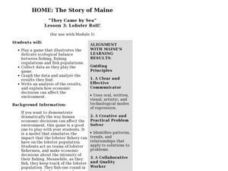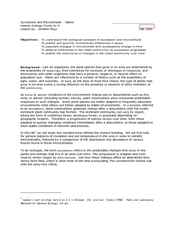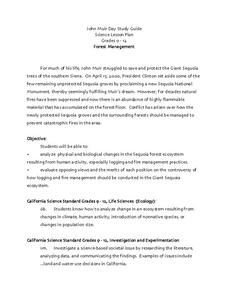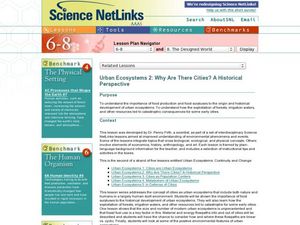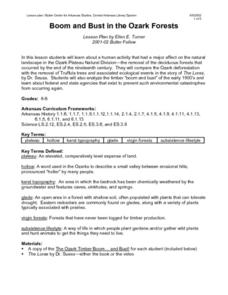Curated OER
Predator-Prey Relationships
Young scholars understand ecological systems. They provide experiences to assist citizens to increase their sensitivity and stewardship for the environment.
Curated OER
The Rain Forest
Middle schoolers acquire knowledge about the basics of the tropical rain forest ecosystem. They analyze the cause/effect relationship between humans attitudes and behavior and the evnvironment. Students list the four general layers of...
Curated OER
City Animals
Students, in groups, conduct research, including interviews of people in various animal related occupations, to identify and describe how animal populations of cities have changed over time, to outline the benefits and problems...
Curated OER
Genetic Disorders with Cultural Roots: International Insects
Students recognize that certain populations have specific genetic disorders that could benefit or harm them in their environment, work out punnett square problems and infer offspring probabilities from results, and provide advantages and...
Curated OER
The Changing Coral Reef Community Game
Students examine organisms that inhabit the coral reefs and their living requirements. In this coral reef lesson students chart population changes and play a game.
Curated OER
Spring of Life
Students explore Florida's springs using video segments. In this video lesson plan, students examine Florida's springs ecosystem, the animals that live there and the red tide that threatens the environment. The lesson plan includes...
Curated OER
Plugged in to CO2
Learners use a meter to measure the energy used and carbon produced by electronics and appliances. In this environmental science and technology lesson, students use a Kill-A-Watt meter to determine the electricity used by everyday...
Curated OER
Saving Habitat
Learners pick an animal native to Maryland and research how populations of that animal might be affected by land use changes over the past thirty years. They predict population trends for the next thirty years.
Curated OER
Lesson 3: Lobster Roll!
Students play a game that illustrates the delicate ecological balance between fishing, fishing regulations and fish populations. They collect data and analyze the results.
Curated OER
Succession and Microclimate
Students compare the population of insects in different microclimates. In this biology lesson, students collect data using probes to tabulate temperature and soil data. They predict how certain parameters change as an area goes through...
Curated OER
Valley of the Butterflies
First graders explore why butterfly populations in Idaho's Lapwai Valley have decreased.
Curated OER
The Arctic and Taiga Ecozone of Canada
Students discover the differences in the Arctic and Taiga regions of Canada. They identify physical and human characteristics of both region. They also practice using an atlas.
Curated OER
Forest Management
Learners explore the changes in the Sequoia forest ecosystem. They evaluate reasons for the changes and discuss opposing views of human activity, logging and fire management practices. Students observe a video, describe the location of...
Curated OER
Land Use
Students examine ecosystems that covered Illinois 200 years ago, investigate some living and non-living components of ecosystems, identify components of prairie system, create food webs, and observe human effects on environment. Lessons...
CFR Washington
Urbanization and Wildlife
Urbanization and how it affects wildlife is the focus of a presentation that uses statistics to make a case for concern and change.
Curated OER
Energy Crisis and Energy Alternatives
In this energy crisis and energy alternatives worksheet, students fill in the blanks of sentences when given terms related to the environment, the energy crisis, renewable resources and non-renewable resources.
Michigan Sea Grant
Wetlands
Wetlands may not sound particularly ornate, but they are as important as any habitat! With a hands-on activity, young scientists build a wetland model and observe its many functions in action. They discover the importance of wetlands to...
University of Kentucky
Beneficial Bug Scavenger Hunt
Many people think of bugs as annoying pests to be squashed, but most insects and spiders are beneficial, eating the actual pests or pollinating plants. After reviewing some of the common bugs in your area (they may differ from those...
Curated OER
Urban Ecosystems 4: Metabolism of Urban Ecosystems
Students discover that material and energy uses by a city come from outside the city boundaries. They realize that the pathway of these material is linear instead of cyclical as they are in natural ecosystems.
Curated OER
Urban Ecosystems 2: Why Are There Cities? A Historical Perspective
Middle schoolers investigate the importance of food surpluses to the historical development of urban ecosystems.
Curated OER
Boom and Bust in the Ozark Forests
Here is a hard-hitting, cross-curricular activity on the effects that the deforestation of the Ozark forests in the 19th century had on the people, animals, and ecosystems of the area. The Dr. Seuss book The Lorax is used as a way of...
Curated OER
Advanced Critical Reading - Columbian Exchange
In this critical reading worksheet, students read a short passage about the Columbian Exchange and then answer questions based on the reading. Students answer questions by making inferences, determining author's point of view and use...
Curated OER
Ethnography of the Lewis & Clark Expedition
Young scholars research the people that Lewis and Clark encountered on their expedition. In small groups, they conduct research on a group of Native Americans, answer research questions, and contribute information to a class chart...
Curated OER
Wild Dog Debate
Learners participate in a mock conference addressing the possible extinction of African wild dogs. In this wild dogs lesson plan, students state their arguments and ask questions about the issues they have researched.










